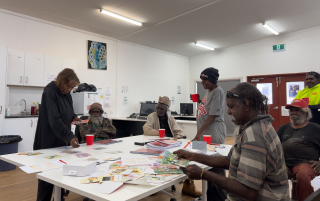An exchange of ideas was the aim of two conferences held on board HMAS Canberra in the Port of Manila during Indo-Pacific Endeavour.
Legal experts engaged on issues of maritime security law, while down the passageway specialists in gender, peace and security discussed the role of women in the prevention and resolution of conflicts.
More than 40 participants from the Armed Forces of the Philippines and ADF, and government agencies from both countries, gathered for the legal workshop.
Armed Forces of the Philippines attendee Colonel Vener Malabanan III said they discussed law and related issues through various tabletop scenarios with an impact on the United Nations Convention on the Law of the Sea (UNCLOS).
UNCLOS is an international agreement that establishes a legal framework for all marine and maritime activities.
Through workshopping scenarios, participants gained confidence to assert the Law of the Sea by talking about how it applies in real-world situations.
“We also tackled other issues including grey zone, issues of arbitral ruling on the West Philippines Sea and other threats to national security involving our maritime domain,” Colonel Malabanan said.
The issues were important, as the Philippines is an archipelagic nation, surrounded by sea, where most of its security threats come from.
“We need the expertise of other countries, particularly Australia, to guide us and help us achieve our maritime security,” Colonel Malabanan said.
Commander Amphibious Task Force Captain Phillipa Hay welcomed participants in Canberra to develop a shared understanding and application of maritime law.
“Military personnel may not be the makers of laws but they contribute to upholding the law. So it’s important that we have a full understanding of what our nations call on us to uphold,” Captain Hay said.
“When we work together, particularly in the sensitive areas, it’s important we have a shared understanding of our sovereign requirements.”
She said it was also important to understand those that may or may not share the same understanding of those laws and how they are applying the law and approaching situations.
In her opening remarks during the gender, peace and security workshop, Deputy Head of Mission Dr Moya Collett said gender spans everything Defence does, with implications for exercises, operations, people and ultimately ability to succeed.
“People do not experience conflict and crisis in the same way – that experience is gendered,” Dr Collett said.
“Women and girls are severely impacted by conflict and crisis, but they are also significantly under-represented in decision-making, isolated from efforts to recover and rebuild. As people who work in conflict and crisis scenarios it is important that we recognise this.
“Gender has cultural, social, economic and political impacts and this is compounded in times of conflict and crisis.
“Women and men also bring different perspectives which are invaluable in every aspect of planning and in the conduct of military operations and activities.”
The day concluded with a welcome reception on board Canberra, where the Navy Band treated senior members of the Armed Forces of the Philippines and other militaries to a traditional ceremonial sunset and performance.







